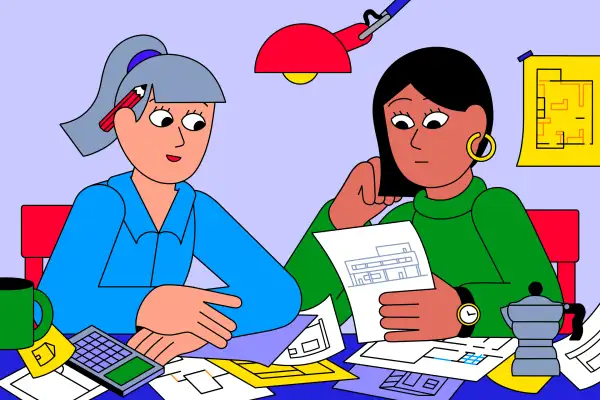House Hunters Who Lost Out Last Year Are Back at It — This Time With New Tactics

Like many Americans, Emily McGregor and Sam Weller set out to become homeowners last year.
In the spring of 2021, the couple began looking for a three-bedroom home in Los Angeles, somewhere in the $800,000 to $1.1 million price range. But after three months of trying — and even expanding their search as far as 70 miles outside the city, the pair bowed out.
“We were feeling overwhelmed by the process and frustrated that we kept getting outbid,” says McGregor, a film director and owner of marketing agency PenguinCat Creative. “We just felt it was better for our mental health to step away.”
They’re not alone. According to a recent survey by Realtor.com, more than a quarter of people who tried to become first-time homeowners last year failed. With rising prices (up 18.8%), high buyer demand and a dearth of inventory, the housing market was more competitive than ever last year.
Still, buyers aren’t willing to be kept down for long. Of those who failed to buy, nearly three out of four said they plan to try again in 2022 — and McGregor and Weller are among them. The couple restarted their search a few weeks ago and are already in contract on a four-bedroom home in Reseda, a neighborhood in the San Fernando Valley region of LA.
“We're honestly just relieved to be done,” says Weller, a creative director and copywriter at PenguinCat.
What did they do differently this time, and how can others like them win out, too? Re-emerging buyers (and their agents) have some ideas.
Unfortunately for buyers, it’s still a competitive sellers’ market. To succeed on their second go-around, McGregor and Weller approached the search a little more aggressively. As their real estate agent, Stephen Katz, put it, “I feel as if they had a more 'We're going to do what it takes to win' mindset.”
Since taking a pause allowed them to save more money, they also felt comfortable making more competitive offers. They won the Reseda home by offering nearly $65,000 over asking price, beating out 14 other buyers in the process.
But more money isn’t the only way forward for take-two buyers. Dallas podiatrist Nam Tram, for example, is switching up the type of property he’s looking for this time.
“Initially, we were looking at single-family homes,” Tram says. “We’ve opened up our search to also include multifamily properties.”
Tram hopes the switch — as well as changing agents — will make the difference. He plans to rent out any extra units to subsidize the higher mortgage payments.
Lisa Kim, co-owner of Oak & Co., an eXp Realty brokerage, has clients taking a similar approach.
“Instead of only looking at detached homes, they decided to expand their search to include semi-detached and townhomes,” Kim says. “They realized this is a first home — a steppingstone. It doesn't have to be their forever home, but it’s best to get into the market now before it escalates further.”
Other buyers are focusing on geographic changes. Compass agent Phillip Salem, for example, has several clients who hit pause on their Manhattan searches last year. When they jumped back in 2022, they expanded into Brooklyn and landed properties within weeks.
Jen-ai Notman, founder of consulting firm Eshe Agency, made an even bigger geographic jump. After getting outbid on four homes in Virginia Beach last year, she decided to move her search 1,500 miles away — to Austin, Texas this year. She closed on a home this week.
“We had lost out on three homes in Virginia, and on the last one, we just said, ‘If we don’t get this one, we’re trying somewhere else,’” Notman says. “It was a bit of a throwing-a-dart-at-a-map moment.”
Though Austin’s no cheaper than Virginia Beach, Notman says the move was the right one. Being less familiar with the city made her more clearly define what she wanted in a property — something she says made it easier to not just find a place but be more aggressive in bidding for it too.
“At the end of the day, I think we just put a lot more thought into what we wanted because we had to move to a new city,” Notman says. “That helped us refine what we were looking for and also be more confident pulling the trigger.”
Get savvy about how you’ll pay
Agents have other tips for buyers getting back into the market. First, they say, have a fully underwritten pre-approval for a mortgage. Unlike traditional preapprovals, these aren’t just indicators that a borrower will likely be approved for a loan. They require financial documentation, a credit check and a detailed financial analysis, making them all but guaranteed. (The lender just needs a property address and an appraisal.)
“If you’re getting a loan, ask the lender to get underwriter approval prior to writing an offer so that the loan contingency can either be waived or shorter,” says Sharon Umansky Benton, an agent with The Agency in Los Angeles. “This helps make it as strong as a cash offer.”
That last point is important because cash offers are another way buyers can improve their chances of winning a home. According to Redfin, cash offers accounted for nearly a third of all home sales in 2021. Sellers like them because they’re seen as a safer bet and typically close faster.
“They’re more secure for the seller because they provide fewer risks of the deal falling through,” says Shaival Shah, CEO and co-founder of Ribbon, a cash-offer homebuying solution. The company will make a cash offer on a buyer’s behalf, providing a leg up in a bidding war. The buyer then has six months to get a mortgage and rents the home from Ribbon in the meantime.
If a cash offer or cash-offer solution isn’t feasible, buyers should plan to shop for homes well under their maximum price range, so they can comfortably offer more than the asking price. Fixer-uppers and homes that need a little TLC can be a good option if you can’t spend a ton, as they typically have less competition.
As Benton advises, “Look at options that other people might overlook.”
Still not ready? Take precautions
Buyers not quite ready to jump back into the house hunt should stow their homebuying funds in a safe place (ideally a high-yield savings account or another an interest-earning account).
“Buyers who hit pause should absolutely keep their down payment funds in a savings account until they are ready to jump back in,” Salem says. “It's a guaranteed way of ensuring the funds will be there when they are ready to restart their search. I have had some invest it in the stock market or crypto, but sometimes, the market is so up and down. Holding it in savings is the only way to ensure it will be there when they jump back in.”
Buyers can also use the downtime to increase those savings. The more cash a buyer has available, the more they can offer. They can also increase their down payment, earnest money deposit and other line items that can make their offers more attractive.
More cash is also critical as inflation and interest rates rise. The average mortgage rate on 30-year loans clocked in at nearly 4% this week and has jumped almost a full percentage point since the end of December. Experts predict rates (as well as home prices) will continue rising as the year goes on.
“They're going to have to up their budgets,” says Mayer Dallal, managing director at mortgage lender MBANC. “Interest rates are going to keep creeping up, and home prices may either continue to rise or may flatten, but I don't see them going down anytime soon. A budget that was reasonable a couple of months ago may not be as interest rates climb.”
More from Money:
Why Investors Are Scooping up So Much Real Estate — and How Regular Homebuyers Can Compete
Homeownership Drifts Further Out of Reach as Mortgage Rates Climb
